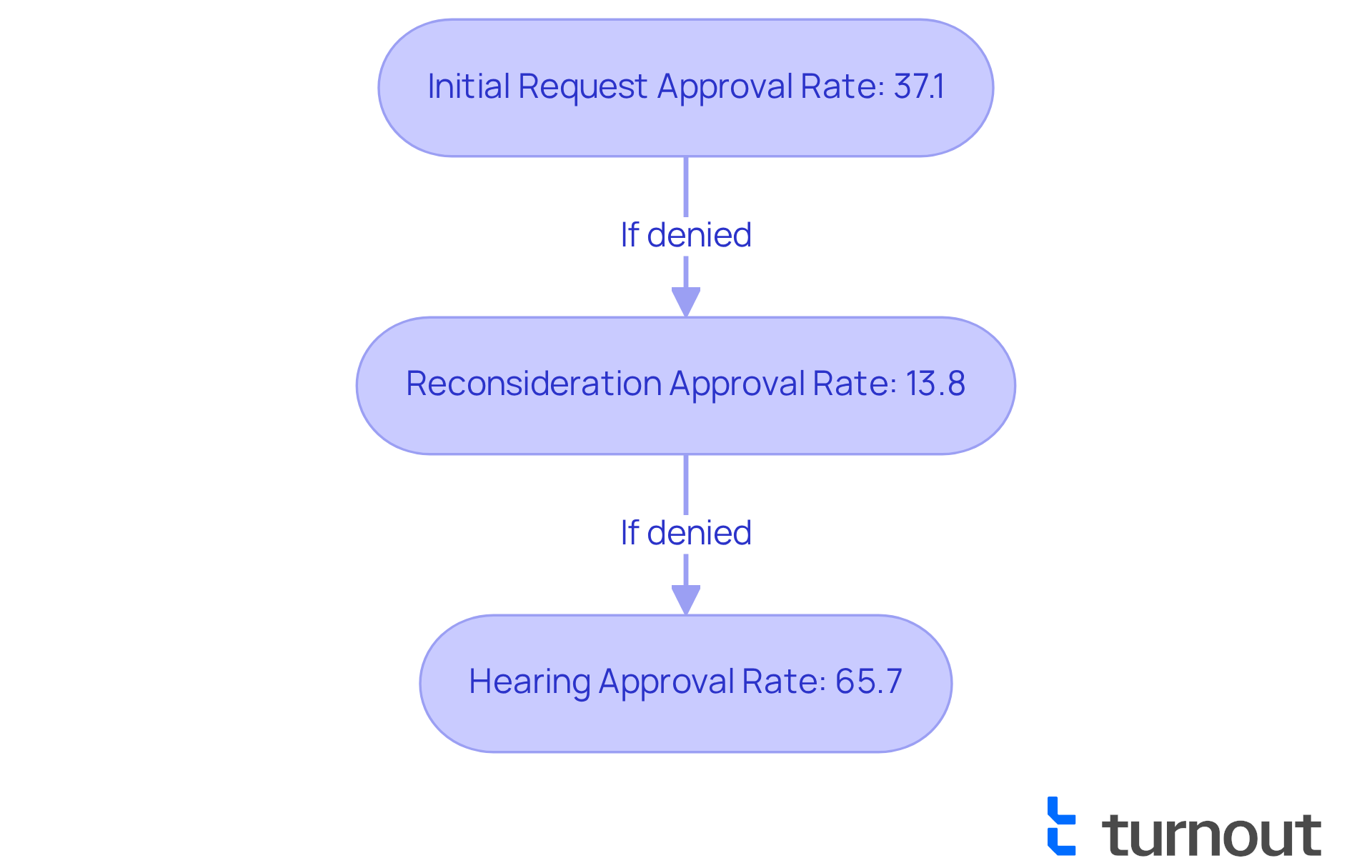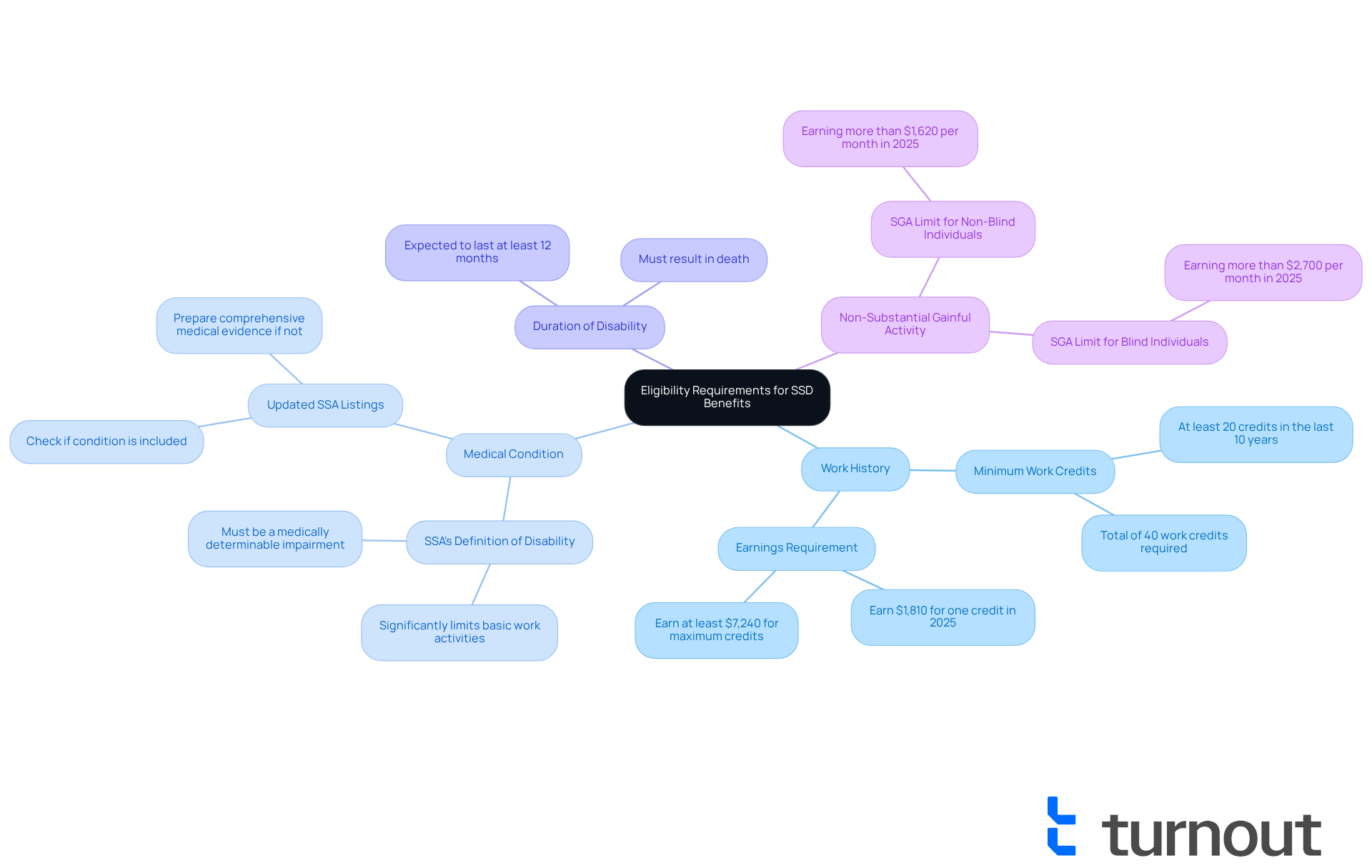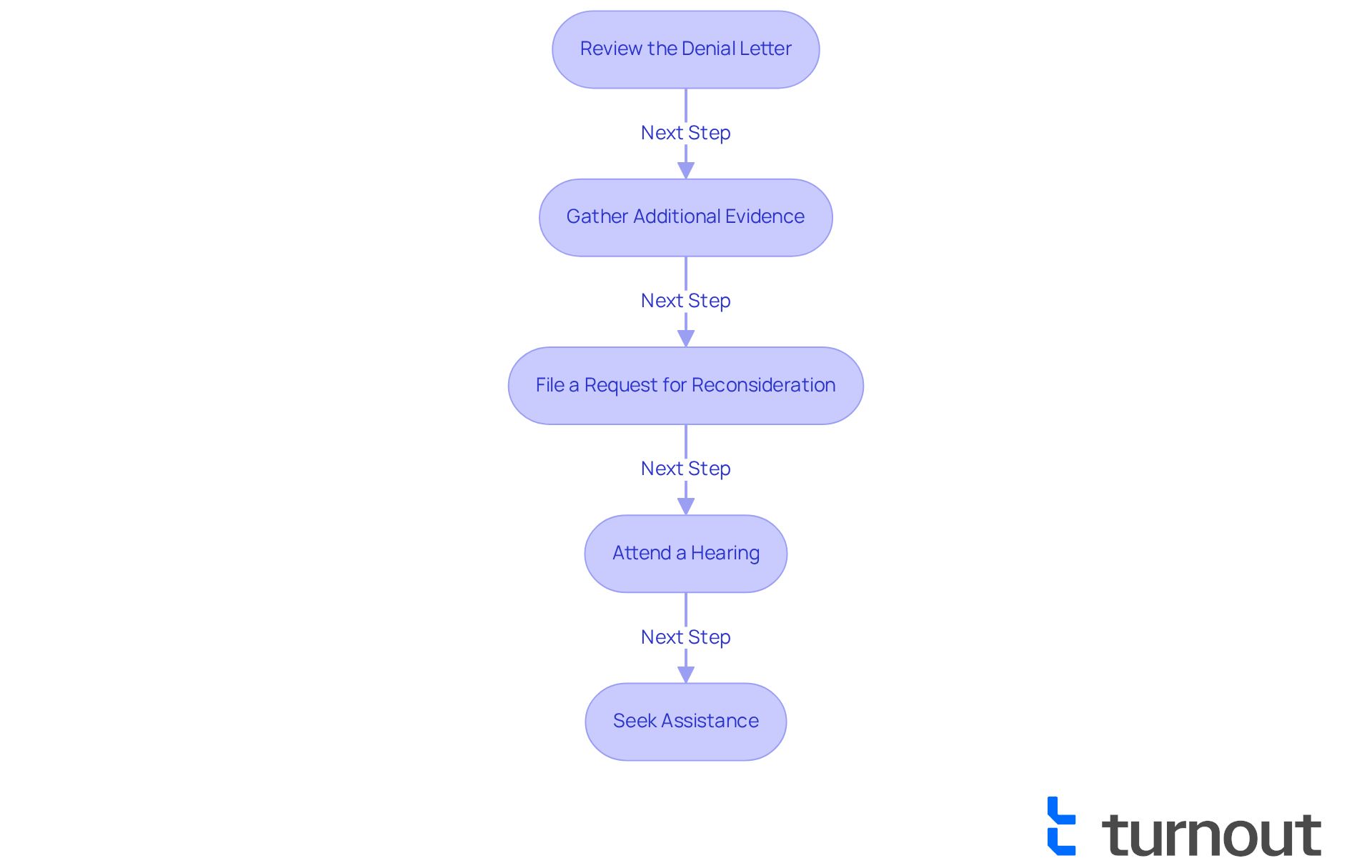Overview
Navigating Social Security Disability (SSD) in North Carolina can feel overwhelming. We understand that the application process, eligibility requirements, and appeals system may seem daunting. It's important to know that you're not alone in this journey.
While initial approval rates can be low—especially during the reconsideration stage—there is hope. Applicants often find that their chances of success improve significantly during hearings. This underscores the importance of thorough documentation and having supportive advocacy throughout the process.
Remember, we’re here to help you every step of the way. By understanding the process and preparing adequately, you can increase your chances of receiving the support you need. You deserve assistance, and we encourage you to reach out for the guidance that can make a difference.
Introduction
Navigating the complexities of Social Security Disability (SSD) in North Carolina can feel overwhelming, especially for those facing the challenges of a qualifying disability. With over 279,000 individuals in our state depending on this vital financial support, understanding the nuances of the application process is essential.
We understand that the journey can be fraught with uncertainty, and it’s common to wonder how to enhance your chances of securing the benefits you deserve. This guide aims to illuminate your path through the SSD landscape, offering insights and strategies to help you navigate these challenges and maximize your opportunities for success.
Remember, you are not alone in this journey; we’re here to help.
Overview of Social Security Disability in North Carolina
(SSD) is a federal program that provides crucial to . In North Carolina, the program for social security disability is managed by the Social Security Administration (SSA), focusing on supporting those who have contributed to the Social Security system through their work history. As of 2025, approximately 279,258 disabled workers in North Carolina rely on social security disability, highlighting the program's vital role in providing essential support during challenging times.
We understand that navigating the can be overwhelming. It consists of three stages:
- Initial request
- Reconsideration
- Hearing
In North Carolina, the present a varied landscape: the initial submission phase has a 37.1% approval rate, slightly below the national average of 39.5%. The reconsideration stage sees an even lower approval rate of 13.8%, compared to the national average of 15.1%. However, it’s encouraging to note that the hearing stage offers a more favorable outcome, with a 65.7% approval rate, which is significantly higher than the national average of 57.7%. This discrepancy suggests that while initial submissions and reassessments may pose challenges, there is a greater chance of success at the hearing phase.
Advocates emphasize the importance of and the application steps. Knowing state-specific trends, wait times, and approval rates can significantly enhance a candidate's chances of success. As one supporter mentioned, having a can increase the chances of approval by as much as three times compared to managing the process independently. Recent modifications to the social security disability initiative in North Carolina aim to simplify the submission system and enhance accessibility. It’s essential for individuals seeking assistance to stay informed about these changes.
In summary, the program for social security disability in North Carolina plays a crucial role in . By understanding the benefits available and the complexities of the , you can better position yourself to secure the financial assistance you need. Remember, you are not alone in this journey; we’re here to help.

Eligibility Requirements for Social Security Disability Benefits
Navigating the process of qualifying for in north carolina can feel overwhelming, but understanding the can help ease your concerns. Here’s what you need to know:
- Work History: You should have worked in jobs covered by Social Security, earning enough work credits—typically at least 20 credits in the last 10 years before your disability began.
- Medical Condition: It's essential that your medical condition aligns with the SSA's definition of disability, meaning it significantly limits your ability to perform basic work activities.
- Duration of Disability: Your disability must be expected to last at least 12 months or result in death.
- Non-Substantial Gainful Activity: You should not be engaging in substantial gainful activity (SGA), which is defined as earning more than $1,620 per month for non-blind individuals in 2025.
We understand that grasping these requirements is vital for assessing your eligibility and preparing a successful application. In North Carolina, many candidates meet the for . However, it’s common to face challenges in navigating the in north carolina.
Fortunately, the program provides access to skilled who can assist you in and ensuring your condition is accurately reflected in the latest SSA listings. This support can enhance your likelihood of approval.
It's important to note that these advocates do not provide legal representation or guidance. However, consulting with trained non-professional advocates can offer throughout your application journey, helping you navigate the complexities of SSD claims effectively. Remember, you are not alone in this process, and we're here to help you every step of the way.

Step-by-Step Guide to Applying for SSD Benefits
Applying for benefits can feel overwhelming, but we're here to guide you through each :
- : Start by collecting your medical records, work history, and any other relevant documents that support your claim. We understand that thorough documentation is crucial, as incomplete submissions can lead to delays or denials. Our trained are available to help ensure your documentation is complete and precise. Please remember, we are not a legal practice and do not provide legal guidance.
- Complete the Application: You have the option to apply online through the SSA website, by phone, or in person at your local SSA office. It's vital to ensure all information is accurate and comprehensive, as mistakes can significantly impact your submission. Understanding the in North Carolina is key, and our advocates are here to help clarify these criteria for you.
- : Once your application is complete, submit it along with all supporting documents. Keeping copies for your records is important, as it provides a reference for any future inquiries. Our services are designed to assist you in navigating this submission process, helping you avoid common obstacles.
- : After you submit your application, it's important to monitor its status. You can check online or contact the SSA for updates. Current statistics show that initial SSDI decisions take about 7-7.5 months, a wait time that has increased by 86% since pre-pandemic levels. Staying informed is crucial during this period, and we encourage you to remain proactive while you wait.
- Respond to Requests: Be prepared to provide additional information if the SSA requests it during the evaluation. Quick responses can help expedite your claim. With our support, you can ensure that you respond promptly and effectively to any requests from the SSA.
By following these steps and utilizing our resources, you can simplify your approach and enhance your chances of a successful claim. In North Carolina, around 54% of individuals who contest their initial rejection for [social security disability](https://myturnout.com) in North Carolina find success at the hearing stage. This highlights the importance of perseverance and proper documentation throughout your submission journey. Remember, you are not alone in this process; we are here to help you every step of the way.

Common Challenges and Solutions in the SSD Application Process
Many candidates encounter challenges during the SSD submission process. It's important to recognize these difficulties and find ways to navigate them effectively. Here are some common issues and their :
- Incomplete Documentation: Many submissions are denied due to missing or insufficient documentation. We understand how frustrating this can be.
Solution: Make sure all medical records and supporting documents are complete and up-to-date before submission. This simple step can help avoid unnecessary delays. - : The evaluation period for in North Carolina can extend over several months, particularly due to significant backlogs. It's common to feel anxious during this waiting period.
Solution: Stay proactive by regularly checking the status of your application and responding promptly to any requests from the Social Security Administration (SSA). This can help ease your concerns. - : in North Carolina are often denied, with a denial rate of 72.2%. This can be disheartening.
Solution: If your claim is denied, take the time to carefully . Consider appealing the decision. Providing additional evidence or seeking expert assistance can significantly improve your chances of success. - Understanding Medical Criteria: Many applicants struggle to determine if their condition qualifies for benefits. You're not alone in this uncertainty.
Solution: Consult with a who can clarify the medical criteria and help strengthen your case. Together, you can ensure that you present the most compelling evidence possible.
By understanding these challenges and their solutions, you can more effectively. Remember, we're here to help you enhance your chances of obtaining the .

Navigating the Appeals Process for Denied SSD Claims
If your is denied, remember that you have the right to appeal this decision. We understand that this can be a challenging experience, but here’s how to navigate the with confidence:
- Review the Denial Letter: Take a moment to understand the reasons for denial; this will guide your next steps. It’s common for qualified claimants to face denials due to incomplete or unclear medical documentation, rather than their actual disability status.
- Gather Additional Evidence: Collect any new medical evidence or documentation that supports your claim. Comprehensive medical records, including physician’s examination notes and mental health records, are crucial for demonstrating the severity of your condition.
- File a Request for Reconsideration: You can within 60 days of receiving the denial letter. This involves a complete review of your case by a different SSA representative. In 2024, 84% of cases at this stage were denied, highlighting the .
- Attend a Hearing: If the reconsideration is denied, you can request a hearing before an administrative law judge. This is your opportunity to present your case in detail, and preparation is key. Approval rates at this stage can reach around 51%, especially for those who present strong evidence and testimony. As noted by Kellum Law Firm, "Knowing what to expect and how to approach each stage can significantly impact the success of your appeal."
- Seek Assistance: Consider collaborating with trained to enhance your appeal and manage the intricacies of the process. It’s important to note that this organization is not a legal practice, and the advocates do not offer legal representation. However, they are qualified to support you in gathering compelling evidence and understanding the nuances of the SSD claims system. The importance of showing that approval rates are notably higher for claimants with assistance compared to those who navigate the hearings independently.
By following these steps and utilizing the resources available through Turnout, you can effectively challenge a denial and work towards securing the benefits you deserve. Remember, you're not alone in this journey; we're here to help.

Conclusion
Understanding the complexities of Social Security Disability (SSD) in North Carolina is crucial for individuals seeking financial assistance due to disabilities. We recognize that navigating this system can feel overwhelming. This guide has outlined the essential aspects of the SSD program, from its significance in supporting disabled workers to the intricate application process that many face. By familiarizing yourself with the eligibility requirements, approval rates, and the importance of thorough documentation, you can significantly enhance your chances of securing the benefits you need.
The article has detailed the step-by-step process involved in applying for SSD benefits. It highlights the importance of gathering proper documentation, completing the application accurately, and following up diligently. It's common to encounter challenges, such as incomplete submissions and long wait times. However, practical solutions are provided to help you navigate these obstacles effectively. Furthermore, seeking assistance from trained nonlegal advocates can bolster your application or help you appeal a denial.
Ultimately, the journey through the SSD application process can be daunting, but it is essential to remain informed and proactive. By leveraging the insights and strategies outlined in this guide, you can approach your claims with confidence and resilience. Remember, support is available, and you are not alone in this process. Taking the necessary steps to understand and navigate the SSD system can lead to the financial relief that many individuals and families desperately need.
Frequently Asked Questions
What is Social Security Disability (SSD) in North Carolina?
SSD is a federal program that provides financial assistance to individuals unable to work due to qualifying disabilities. In North Carolina, it is managed by the Social Security Administration (SSA) and supports those who have contributed to the Social Security system through their work history.
How many disabled workers in North Carolina rely on SSD?
As of 2025, approximately 279,258 disabled workers in North Carolina rely on social security disability.
What are the stages of the SSD submission process?
The SSD submission process consists of three stages: Initial request, Reconsideration, and Hearing.
What are the approval rates for SSD in North Carolina?
The approval rates in North Carolina are as follows: the initial submission phase has a 37.1% approval rate, the reconsideration stage has a 13.8% approval rate, and the hearing stage has a 65.7% approval rate.
How does the hearing stage approval rate compare to the national average?
The hearing stage approval rate in North Carolina (65.7%) is significantly higher than the national average (57.7%).
What are the eligibility requirements for SSD benefits in North Carolina?
The eligibility requirements include: - Work History: At least 20 work credits in the last 10 years before the disability began. - Medical Condition: Must align with the SSA's definition of disability. - Duration of Disability: Expected to last at least 12 months or result in death. - Non-Substantial Gainful Activity: Not earning more than $1,620 per month for non-blind individuals in 2025.
How can non-legal advocates assist in the SSD application process?
Non-legal advocates can help gather thorough medical documentation and ensure that your condition is accurately reflected in the latest SSA listings, which can enhance your likelihood of approval. However, they do not provide legal representation or guidance.
What recent changes have been made to the SSD initiative in North Carolina?
Recent modifications aim to simplify the submission system and enhance accessibility for individuals seeking assistance.
Why is it beneficial to have a qualified representative during the SSD application process?
Having a qualified representative can increase the chances of approval by as much as three times compared to managing the process independently.




